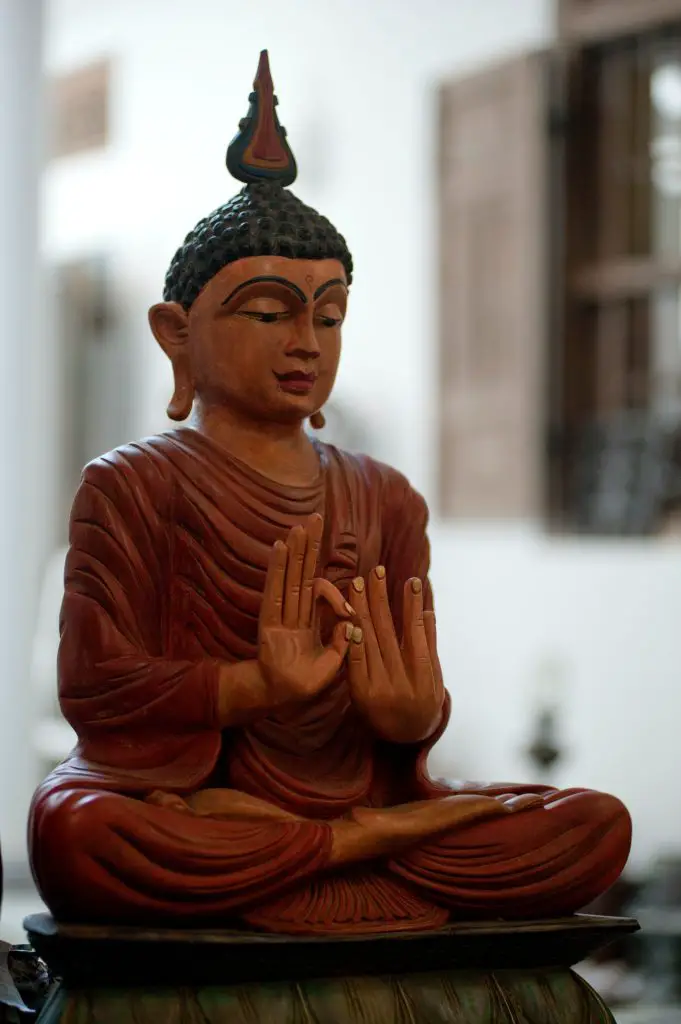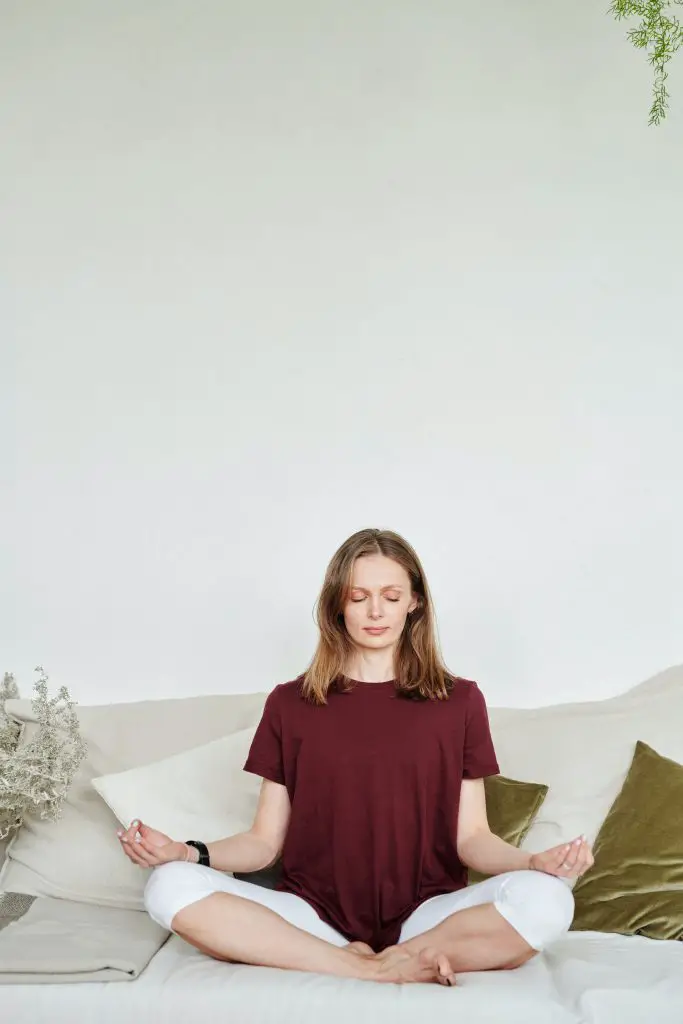Koan meditation is a form of Zen meditation practice that allows one to criticize the world as it is. No deeper thoughts or extreme body positions; just you, sitting down and taking in everything around you.
But it can be quite difficult to understand and practice without proper guidance. That’s where this article comes in. In this guide, we have gone through every detail regarding koan meditation & how to do it properly.
So, follow each step and you will become a master of Koan in no time
What is Koan Meditation Practice?

In short, it is a form of Zen Buddhist meditation that involves contemplating a paradoxical statement or question, called a koan. The goal of this practice is achieving enlightenment.
Koans are typically short, cryptic statements, dialogues, or stories that challenge a person’s logical or rational mind. It encourages them to go beyond the boundaries of conventional thinking.
They are not meant to be solved through intellectual analysis, but rather to be contemplated deeply and directly, to experience a moment of insight or realization.
This form of questioning is intended to give us a better understanding of life in general & how to be one with your true self.
In koan practice, a teacher assigns a koan to a student, who then spends time reflecting on it in silence and attempting to understand its meaning.
The student may also engage in a dialogue with the teacher, who may ask questions or offer guidance to help deepen their understanding.
This practice is considered a difficult and advanced form of meditation, and it is typically reserved for experienced practitioners who have already established a solid foundation in mindfulness and concentration.
However, anyone can benefit from contemplating koans, even if they are not actively engaged in formal practice.

The Benefits of Zen Koans
The benefits of koan method can vary depending on the individual, but some common benefits reported by practitioners include the following:
Increased Clarity & Insight
As you start to live in the moment, through your koan training, you will gain a deeper understanding of your surrounding. This will lead you to get a clear sight of your goals and bring peace to your mind.
Reduced Stress & Anxiety
Many zen practitioners prioritize koan study over other forms of zen practice due to the fact once you have mastered your koan training, just a few minutes of meditation will calm your mind and reduce the stress that self-demeaning brings to your body and soul.
Enhanced Consciousness & Concentration
Zen training will also help you to unleash the innate wisdom of the universe hidden in you and give you a clear path to follow. This means you will be able to focus on your work more and there won’t be any great doubt that will cloud your judgment.
Greater Self-Awareness
By practicing meditation regularly, you will be on a spiritual journey that will lead you to find the meaning of life. This is the buddha nature is primarily followed by almost most zen masters.
Also, a greater self-awareness will only make it easy for you to enjoy daily life and see the world in a completely new color.
How to Practice Zen Buddhist Koans like Zen Masters

Doing koan training without someone to guide you can be a bit difficult. Don’t worry, just follow these steps to practice koan meditation perfectly:
Step 1: Get into Position
First, find a quiet and comfortable place to sit. You can sit cross-legged on a cushion, or in a chair with your feet flat on the ground. Settle into a relaxed but alert posture. Keep your back straight and your eyes lowered, with your hands resting in your lap.
Some refer to this position as the prayer position. You can incorporate other forms of meditation position, but the prayer position is the best suited for Koan training.
Make sure that you are comfortable before you start any form of meditation. You won’t be able to connect to your surroundings if your whole body isn’t relaxed.
Step 2: Control Your Breathing
Next, you will need to focus your attention on your breath. Start with a few deep breaths and then allow your breath to become natural and unforced. Simply observe the sensation of your breath moving in and out of your body.
The main purpose of Koan is not to force the body to do something that it doesn’t want to. So, don’t push yourself and take one thing at a time. Taking deep breaths easily calms down the body.
Step 3: Focus on Your Koan
Bring your koan to mind. Now there are many types and variations of Koan, you will need to choose one beforehand. Your koan can be anything, just find the one that resonates with you. The koan might be a question, statement, or story that seems paradoxical or puzzling.
As you start to focus, try to engage with your koan. Allow the koan to occupy your mind, but don’t try to analyze or solve it. Simply let it be there, and observe your thoughts and feelings as they arise in response to the koan. Mu koan is the primary form of any koan, which resonates with the thought of not knowing.
So words or sentences that represent similar meanings can be the koan you are looking for.
Step 4: Stay in the Zone
Keep concentrating on your koan don’t let go even when your mind wanders or you become distracted. Allow the koan to work on you, without trying to force any particular outcome.
You need to embrace the “don’t know” mind. As you engage with the koan, you may find that you reach a point of “not-knowing,” where you are no longer trying to analyze or solve the koan. This is a state of openness and receptivity, where insights and breakthroughs can occur.
Step 5: Retrace to Step 1
Once you are satisfied with your meditation or you think that you have connected with yourself a bit more, you can stop. But don’t immediately get up, slowly let the Koan go, and then take a few more deep breaths before standing up.
Keep in mind that mastering koan requires a lot of practice & guidance. At your first koan session, it can be a bit difficult to take everything in. But you will slowly improve. So don’t lose hope. You can also opt for a teacher if you want to.
Should You Focus On A Single Word Koan or Multiple Koans?
There are many koans that you can opt for. Whether to focus on a single word koan or multiple koans is a matter of personal preference and can depend on various factors, such as the individual’s level of experience or the methods he or she’s been following.
In general, beginners may benefit from working with a single-word koan, as it can provide a more focused and structured approach to their practice. This can help them to develop a deep understanding of the koan and to develop the skills and insights needed to work with more complex koans.
On the other hand, more experienced practitioners may benefit from working with multiple koans. This is because it can provide a broader range of perspectives and challenges to their practice. It can help them to deepen their understanding of the nature of reality and to develop a more intuitive and spontaneous approach to their practice.
Ultimately, the key is to work with a koan or koans that resonate with you and to seek guidance from a qualified teacher who can help you to navigate the challenges and insights of koan practice.
Koan Meditation Vs Traditional Meditation Practice
Both have some similarities, but they are also distinct practices with different approaches and goals. Let’s find out which one is better for you.
Point of Focus
Traditional meditation practices, such as mindfulness meditation or concentrative meditation, often involve focusing one’s attention on a particular object. You can concentrate on the pattern of your breath, a sound or a mantra, as well as dwell on one’s thoughts and emotions without judgment.
The goal of traditional meditation practices is often to develop greater focus, relaxation, and insight into the workings of one’s mind.
Koan method, on the other hand, involves contemplating a riddle-like question or statement, known as a koan, that appears paradoxical or contradictory on the surface. The meditation method aims to help the practitioner to achieve a state of insight or enlightenment through the direct experience of reality beyond concepts and dualities.
While traditional practices can help practitioners to develop greater focus and insight, koan is specifically designed to challenge the mind and disrupt habitual patterns of thinking.
This can lead to a deeper understanding of the nature of reality and a broader realization of peace, clarity, and well-being.
Both traditional meditation practices and koan practices can be beneficial for developing greater self-awareness, reducing stress and anxiety, and improving overall well-being.
However, the approach and goal of each practice are different, and practitioners may find that one approach resonates with them more than the other.
Is Koan Meditation the Best Solution for Reaching Zen?
No, koan meditation is a traditional practice in Zen Buddhism that can be a powerful tool for developing insight and reaching a state of Zen or enlightenment. However, it is not necessarily the best or only solution for everyone.
The path to Zen or enlightenment is a personal and unique journey, and different practices and approaches may be more or less effective for different individuals.
Some practitioners may find that other forms of meditation, such as mindfulness or Vipassana meditation, are more effective for them. On the other hand, others may find that Zen meditation or other forms of spiritual practice are more effective.
Additionally, reaching a state of Zen or enlightenment is not necessarily the goal of everyone who practices meditation or engages in spiritual practice.
For some, the goal may be simply to cultivate greater self-awareness, reduce stress and anxiety, or develop greater compassion and empathy for others.
But in the end, it all comes down to the level of practice and dedication one has for reaching zen. You can meditate with any method as long as you can connect with yourself. Zen tradition prefers Koan training but it in any case is the only answer to reaching serenity and enlightenment.
Here is a lengthy discussion about Zen Koans:
Final Thoughts
Koan meditation can look quite difficult at first glance and if you don’t know the proper method then it becomes more difficult. But if you can follow the steps we have mentioned in this guide then we believe you won’t face any problems. Best of luck!
